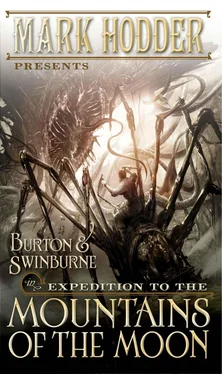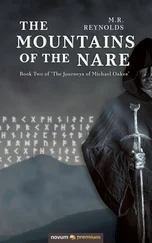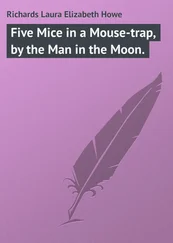Mark Hodder - Expedition to the Mountains of the Moon
Здесь есть возможность читать онлайн «Mark Hodder - Expedition to the Mountains of the Moon» весь текст электронной книги совершенно бесплатно (целиком полную версию без сокращений). В некоторых случаях можно слушать аудио, скачать через торрент в формате fb2 и присутствует краткое содержание. Жанр: sf_stimpank, на английском языке. Описание произведения, (предисловие) а так же отзывы посетителей доступны на портале библиотеки ЛибКат.
- Название:Expedition to the Mountains of the Moon
- Автор:
- Жанр:
- Год:неизвестен
- ISBN:нет данных
- Рейтинг книги:5 / 5. Голосов: 1
-
Избранное:Добавить в избранное
- Отзывы:
-
Ваша оценка:
- 100
- 1
- 2
- 3
- 4
- 5
Expedition to the Mountains of the Moon: краткое содержание, описание и аннотация
Предлагаем к чтению аннотацию, описание, краткое содержание или предисловие (зависит от того, что написал сам автор книги «Expedition to the Mountains of the Moon»). Если вы не нашли необходимую информацию о книге — напишите в комментариях, мы постараемся отыскать её.
Expedition to the Mountains of the Moon — читать онлайн бесплатно полную книгу (весь текст) целиком
Ниже представлен текст книги, разбитый по страницам. Система сохранения места последней прочитанной страницы, позволяет с удобством читать онлайн бесплатно книгу «Expedition to the Mountains of the Moon», без необходимости каждый раз заново искать на чём Вы остановились. Поставьте закладку, и сможете в любой момент перейти на страницу, на которой закончили чтение.
Интервал:
Закладка:
“Multiple futures,” he said. “Different histories. Maybe some of them don't end like this. I should like to visit them.” He returned his dreadful gaze to the explorer. “Perhaps we'll get it right in one of them, hey?”
He made Wells stretch and groan.
“Ho hum, Sir Richard! Ho hum! I've been here long enough. It's not comfortable. Has he told you how his leg is perpetually paining him? I don't know how he can bear it. Anyway, I'll say farewell. We shall meet again, sir; in this world or another version of it; maybe in your time, maybe in mine, maybe in another. But we shall meet again. And when we do-”
Wells smiled wickedly. The expression lingered, then the black faded from his eyes, they slipped up into his head, and he fell sideways from his saddle to the ground.
Burton hurriedly dismounted and threw himself down beside his friend.
“Bertie! Bertie!”
The war correspondent rolled onto his side and vomited. He curled into a fetal position and moaned. “He was in my head. The filth, Richard! The filth of the man! He's the Beast personified!”
“Has he gone? Is he watching us?”
“He's gone. But he's going to come after you. Wherever- whenever -you are-he's coming after you!”
Burton helped Wells to sit up. The smaller man wiped his mouth and looked at the far-off mushroom cloud, and the flying machine shrinking to the south.
“It's finished,” he said. “The Germans probably think they've won, but they're wrong. Everything is ending. This world is done for.”
Burton could think of nothing to say, except: “I'm sorry, Bertie.”
Wells stood, swayed slightly, and reached up to the stirrup of his harvestman.
“Let's get back on the trail. I want to find out where these poppies are leading us.”
They clambered back into their saddles and turned their vehicles, sending them scuttling over the savannah.
For two days, they steered their harvestmen over what, to Burton, was eerily familiar territory.
He felt detached. All the connections to this world, formed over the past five years, were unfastening. Change was coming to him, of that he was certain, but he didn't know how.
Change, or, perhaps, restoration.
The Mountains of the Moon.
His destiny lay there.
Maybe it always had.
The trail of poppies led to those peaks, that was obvious even before the snow-capped summits rose over the horizon. He saw them, jagged and white, seeming to hover in the air above the blood-red base of the mountains.
“Red!” he exclaimed. “I remember this view-but the mountains were green!”
“That might have been true in the 1860s,” Wells replied, “but the Blood Jungle has grown since then.”
They raced over the empty landscape. Where there had once been villages, there were none. Were there had once been herds of antelope and zebra, there was nothing. Where fields had been cultivated, there was now rampant undergrowth.
Increasingly, they saw lurchers. The ungainly plants were shuffling over the hills and through the valleys with an unnerving air of sentience that prompted Wells to ask: “What are the damned things up to, Richard?”
“I know what you mean,” the explorer replied. “They look purposeful, don't they? Do you remember the one that attacked us at Tanga? See how differently they move now! The mindless thrashing has been replaced by shudders and ticks, as if they're operating under some sort of restraint.”
With so much of his memory restored, Burton recognised that the lurchers were the same species of plant as the vehicles the Prussians had used back in 1863-the same but horribly different, for there were no men enfolded in their fleshy petals-which meant, if there was something still controlling them, it wasn't necessarily human.
As they drew closer to the mountains, the vegetation grew thicker and wilder. Its flowers and fruits took on a reddish hue, deepening the farther they travelled, until blood-coloured blooms and berries and globular dew-dripping swellings of indiscriminate form surrounded them. The poppies guided the steam-driven spiders straight into the humid tangle, and, astonishingly, the chaotic verdure parted in front of them to allow their passage.
Shafts of light angled through the trees. Lianas drooped and looped and dangled. The air was heavy with scent, one minute perfumed, the next pungent with the stench of maggoty meat, then delightful again. Fat bees droned lazily through it. Dragonflies and butterflies flitted hither and thither. Seeds floated past on feathery wings. And in the canopy overhead, thousands upon thousands of parakeets squawked and screeched and cackled and whistled and cursed and insulted.
Burton started to laugh and couldn't stop.
Wells, who was at that point leading the way, looked back, raised his eyebrows, and asked: “What the heck has got into you?”
“Pox!” Burton cried out. “Pox and Malady! Ye gods! How many eggs did that confounded bird lay? Hah!” He raised his face to the sky and bellowed: “Pox! Pox! Pox!” then bent forward and was suddenly wracked by violent sobs, for too many memories were returning, and he knew for sure that he was going back, and he recalled what to.
Wells reined in his harvestman until it was beside the explorer's. “What is it, man? Are you all right?”
“I can't bear it,” Burton whispered. “I can't bear it. It would be too much for any man. I have to find a way to change everything, Bertie. Everything.”
“Let's rest here,” the war correspondent suggested. “There's some grub left in one of the packs. We'll eat and grab forty winks.”
They turned off their vehicles' engines and dismounted. Beside them, a thick mass of crimson foliage suddenly rustled and parted like a pair of curtains, unveiling a short pathway to a beautiful poppy-filled glade.
“By golly! An invitation, if ever I saw one!” Wells exclaimed. “Whatever's behind your poppies obviously has power over this jungle, too!”
They walked into the open space and sat down. Wells had carried one of the panniers with him, and now opened it and pulled out a loaf of bread and a wedge of cheese. The two men ate.
Burton appeared lost in himself. His dark eyes were haunted, his cheeks sunken. Wells, feeling concerned, was watching him from the corner of his eye when something else caught his attention. At the edge of the clearing, a tree, heavy with large pear-shaped gourds, was moving. One of its branches, with creaks and snaps, was extending outward, into the open space. Burton, upon hearing it, turned his head and watched as the limb manoeuvred a gourd above them, then lowered it until it hung between the two men.
“A gift?” Wells asked.
Burton reached up to the red pumpkin-sized fruit. It snapped loose from the branch-which swung back out of the way-with ease, and as he lowered it, a small split opened in its top and an amber-coloured liquid sloshed out. He sniffed it, looked surprised, tasted it, and smacked his lips.
“You'll not believe this!” he said, took a swig, and passed the gourd to the war correspondent.
Wells tried it.
“It's-it's-it's brandy!”
They drank, they ate, they were insulted by parakeets.
Night came. They slept.
At dawn, the two men returned to their vehicles and continued along the trail of poppies.
“Either I'm riding a giant steam-powered spider through a benevolent living jungle with a man from the past,” Wells pondered, “or I'm dreaming.”
“Or stark staring mad,” Burton added.
At noon, they came to a steep incline, bracketed on either side by tall pointed outcrops of blueish rock. Burton stopped his harvestman and peered through the branches at the mountains that towered ahead of them. He slid down from his saddle, bent, and examined the ground. The slope was comprised of shale bound together by a network of threadlike roots.
Читать дальшеИнтервал:
Закладка:
Похожие книги на «Expedition to the Mountains of the Moon»
Представляем Вашему вниманию похожие книги на «Expedition to the Mountains of the Moon» списком для выбора. Мы отобрали схожую по названию и смыслу литературу в надежде предоставить читателям больше вариантов отыскать новые, интересные, ещё непрочитанные произведения.
Обсуждение, отзывы о книге «Expedition to the Mountains of the Moon» и просто собственные мнения читателей. Оставьте ваши комментарии, напишите, что Вы думаете о произведении, его смысле или главных героях. Укажите что конкретно понравилось, а что нет, и почему Вы так считаете.












